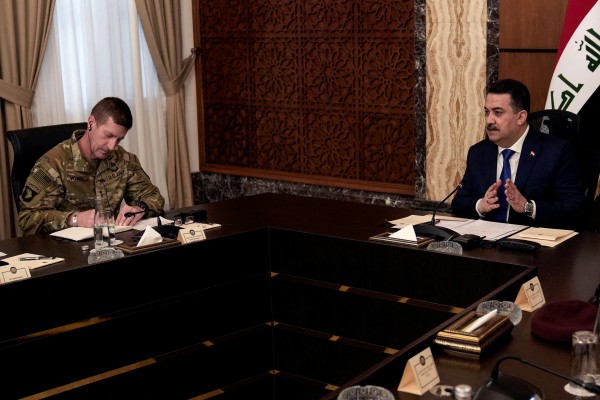The United States and Iraq have reached an understanding on plans for the withdrawal of
U.S.-led coalition forces from Iraq, according to multiple sources familiar with the matter.
The plan, which has been broadly agreed but requires a final go-ahead from both capitals and an announcement date, would see hundreds of troops leave by September 2025, with the remainder departing by the end of 2026, the sources said.
“We have an agreement, its now just a question of when to announce it,” a senior U.S. official said.
NEW – The US and Iraq have reached an understanding on the withdrawal of U.S.-led coalition forces from Iraq, according to multiple sources.
The plan would see 100s of troops leave by September 2025
The rest leave by end-2026
— Timour Azhari (@timourazhari) September 6, 2024
The U.S. and Iraq are also seeking to establish a new advisory relationship that could see some U.S. troops remain in Iraq after the drawdown.
An official announcement was initially scheduled for weeks ago but was postponed due to regional escalation related to Israel’s war in Gaza and to iron out some remaining details, the sources said.
Farhad Alaaldin, foreign affairs adviser to the Iraqi prime minister, said technical talks with Washington on the coalition drawdown had concluded.
“We are now on the brink of transitioning the relationship between Iraq and members of the international coalition to a new level, focusing on bilateral relations in military, security, economic, and cultural areas,” he said.
A U.S. State Department spokesperson and a defense official said U.S. President Joe Biden and Iraqi Prime Minister Mohammed Shia al-Sudani in a joint statement in April affirmed they would review factors to determine when and how the mission of the Global Coalition in Iraq would end and transition to enduring bilateral security partnerships.
The agreement follows more than six months of talks between Baghdad and Washington, initiated by Prime Minister al-Sudani in January amid attacks by Iran-backed Iraqi armed groups on U.S. forces stationed at Iraqi bases.
The rocket and drone attacks have killed three American troops and wounded dozens more, resulting in several rounds of deadly U.S. retaliation that threatened government efforts to stabilize Iraq after decades of conflict.
The U.S. has approximately 2,500 troops in Iraq and 900 in neighbouring Syria as part of the coalition formed in 2014 to combat Islamic State as it rampaged through the two countries.
“Putting military pressure on ISIS in its operational areas remains a key aspect of global counter terrorism efforts.”
More analysis in the latest #CounterPoint Brief👇https://t.co/MjOsq6mNqn— CEP (@FightExtremism) September 6, 2024
The group once held roughly a third of Iraq and Syria but was territorially defeated in Iraq at the end of 2017 and in Syria in 2019. Iraq had demonstrated its ability to handle any
remaining threat, Alaaldin said.
The U.S. initially invaded Iraq in 2003, toppling dictator Saddam Hussein before withdrawing in 2011, but returned in 2014 at the head of the coalition to fight Islamic State.
Other nations, including Germany, France, Spain, and Italy, also contribute hundreds of troops to the coalition.
Under the plan, all coalition forces would leave the Ain al-Asad airbase in western Anbar province and significantly reduce their presence in Baghdad by September 2025.
U.S. and other coalition troops are expected to remain in Erbil, in the semi-autonomous northern Kurdistan region, for approximately one additional year, until around the end of 2026, to facilitate ongoing operations against Islamic State in Syria.
Exact details of troop movements are being kept secret due to their military sensitivity.
The drawdown would mark a notable shift in Washington’s military posture in the region.
While primarily focused on countering Islamic State, U.S officials acknowledge their presence also serves as a strategic position against Iranian influence.
This position has grown more important as Israel and Iran escalate their regional confrontation, with U.S. forces in Iraq shooting down rockets and drones fired towards Israel in recent months, according to U.S. officials.
Iraqi Prime Minister al-Sudani has stated that, while he appreciates their help, U.S. troops have become a magnet for instability, frequently targeted and responding with strikes
often not coordinated with the Iraqi government.
The agreement, when announced, would likely present a political win for al-Sudani as he balances Iraq’s position as an ally of both Washington and Tehran. The first phase of the
drawdown would end one month before Iraqi parliamentary polls set for October 2025.
For the U.S., the two-year time frame provides “breathing room,” allowing for potential adjustments if the regional situation changes, a U.S. official said.
(REUTERS)
In a career spanning three decades and counting, Ramananda (Ram to his friends) has been the foreign editor of The Telegraph, Outlook Magazine and the New Indian Express. He helped set up rediff.com’s editorial operations in San Jose and New York, helmed sify.com, and was the founder editor of India.com.
His work has featured in national and international publications like the Al Jazeera Centre for Studies, Global Times and Ashahi Shimbun. But his one constant over all these years, he says, has been the attempt to understand rising India’s place in the world.
He can rustle up a mean salad, his oil-less pepper chicken is to die for, and all it takes is some beer and rhythm and blues to rock his soul.
Talk to him about foreign and strategic affairs, media, South Asia, China, and of course India.





